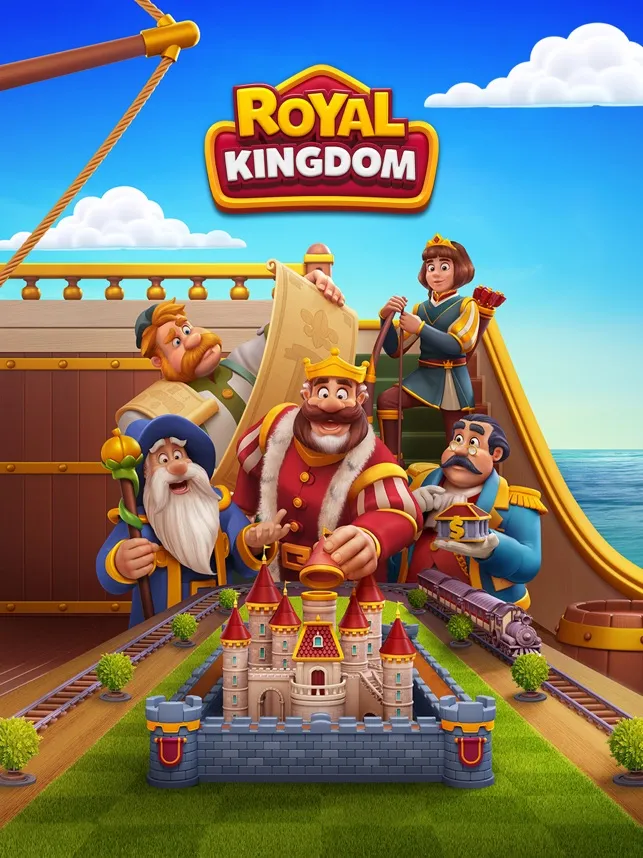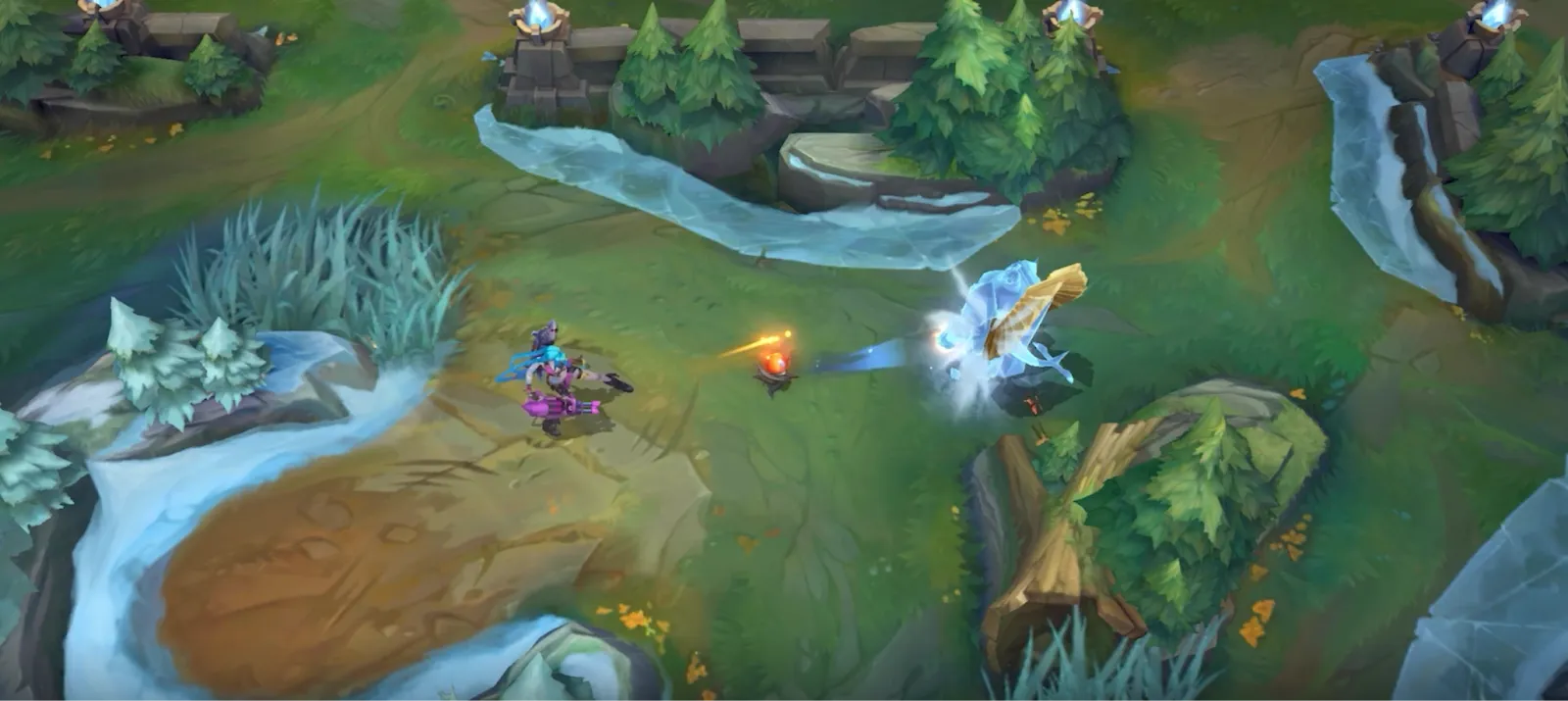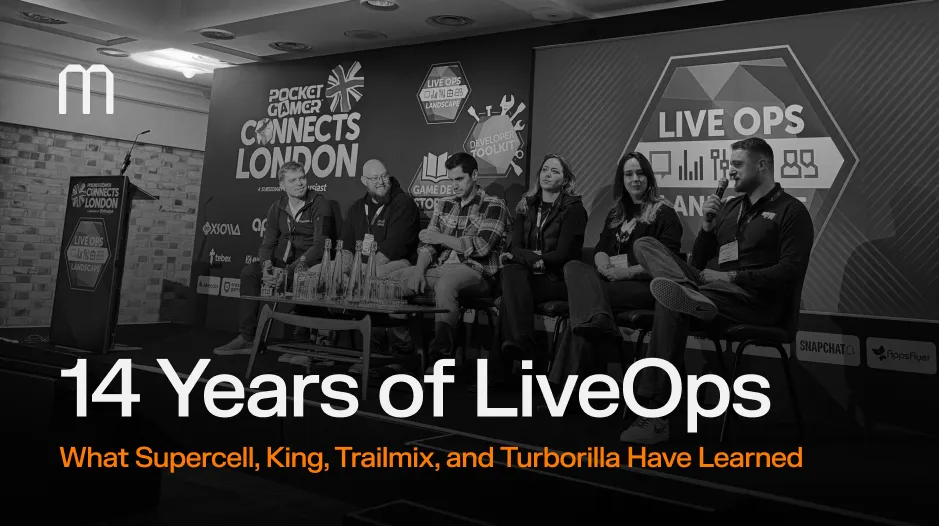From Monopoly Go!'s record-breaking IAP revenue to PUBG Mobile's Dragon Ball collaboration, we break down the strategies behind 2024's most successful live service games - and what went wrong for high-profile failures like Concord.
Live service games' remarkable rise has continued at pace over the past 12 months, bringing us many of the year's biggest hits. And in taking a look at a spread of 2024's most successful and interesting live service games - as well as some of the less triumphant examples - there's plenty to learn about the best strategies going into 2025.
With that in mind, the Metaplay team has pored over 2024's most impactful live service games, and pulled apart those with the most to teach us about LiveOps going forward. Most of our examples have built success on a blend of dazzling game design and a powerful backend (but we have identified a few standout failures, too) - and each has something we can all learn from.
Best Viral Live Service Mobile Game - Monopoly Go!

Reimagining the iconic 1935 board game as a socially-driven casino clicker, Scopely's Unity-powered hit has led IP owner Hasbro to become the most successful game licensor of 2024. By July this year Monopoly Go! became the fastest game ever to hit $3 billion in revenue, taking around 15 months to do so. For Scopely, the brand's global recognition meant particularly low CPIs across its iOS and Android releases.
The live service strategy was built around a regular flow of simultaneous and often smaller-scale community-focused events. Particularly noteworthy were the Partner Events, which encouraged friends to team up and collaborate - something that delivered impressive retention on the back of that low CPI. Scopely have also put a clear focus on the hypothesis that in the age of IDFA, sustainable IAPs are the way forward, and has left its rivals for dust by generating $336 million in IAP revenue in the first quarter of 2024.
Monopoly Go!: Key Learnings
While Monopoly Go!'s enviable $500 million marketing budget no doubt helped, Scopely has demonstrated the power of a busy, fast-cycling, socially-geared event schedule - and the returning power of IAPs. That takes a backend that brings powerful, flexible scheduling and targeting abilities, and tools for building, validating and rolling out updates.
Best Evergreen Live Service Game: PUBG Mobile

Showing that Monopoly Go!'s route to success isn't the only path to sky-high revenues, PUBG Mobile has used large scale, long form events that reinvent the game to continue its success in 2024. A relative veteran of modern live service gaming at six years old in 2024, the battle royale with PC roots unleashed its PUBG Mobile x Dragon Ball Super Z event in July, running until early September. Not only did it introduce familiar monetisation and engagement drivers such as a battle pass and new cosmetic items - an entirely new mode was added that gave the main map an impressive Dragon Ball IP reworking, while tweaking gameplay to reflect the lore of its new partner material. The result was something that felt as authentic to the popular anime as it did to PUBG, refreshing the battle royale to keep players engaged.
In return, PUBG Mobile saw a 30% increase in paying users through the first half of 2024, with its daily active user (DAU) count climbing by 40%. That helped owner Krafton hit just over $4 billion in revenue for the period, marking a 55% lift compared to the same period in 2023.
PUBG Mobile: Key Learnings
Consider how a long-form partner-IP event that revitalises the look and playfeel of your game might help reinvigorate engagement, and in turn, your revenue. But don't put all your eggs in one basket. Around the Dragon Ball event, PUBG Mobile has continued to deliver smaller events and items, as well as collaborations with the likes of Lamborghini, McLaren, and Volkswagen. That's why Metaplay offers advanced targeting and scheduling options for complex chains of limited-time or recurring offers and events - so devs and publishers have a powerful, efficient way to deliver complex, multifaceted, highly successful event strategies.
Best New Live Service Game: Royal Kingdom

Moving on to casual pastures, Dream Games' match-3 puzzler Royal Kingdom only launched globally in late-November this year - banking $450k in four days. That followed a lengthy UK-focused soft launch that pulled in $20 million. Dream Games has already enjoyed massive success in match-3, with genre giant Royal Match - the title Royal Kingdom span out from. Why might Dream choose to expand their portfolio rather than devote all their resources to an existing game?
Dream have kept their cards close to their chest to date, but it appears Royal Kingdom has afforded the studio a chance to try new things in the profitable space it dominates without upsetting the meticulously maintained operation of Royal Match. Through its soft launch, for example, Dream kept its LiveOps minimal, while the developers tweaked granular elements such as progression balancing and UI - making it look very much like an exercise in game refinement. Dream's latest title looks to be moving the dial in the right direction, but for now it can be filed under 'fascinating' rather than 'wildly successful'.
It's perhaps reminiscent of the classic Playrix strategy, deploying changes in themes and gameplay mechanics in new titles to broaden an existing playerbase without alienating current players. In Playrix' case, whilst their newer titles like Manor Matters have enjoyed success, they've never quite garnered enough momentum to knock their original stalwarts (Homescapes, Gardenscapes, Fishdom, Township) off their perches. They also shipped the likes of Wildscapes that introduced more subtle changes and additions but ultimately never quite reached their high standard, and were ultimately killed. The fact Royal Kingdom is already sitting pretty in the US top 20 grossing iOS games suggests that trend isn't likely to continue here, but it'll be interesting to see how it performs against the original nonetheless.
Royal Kingdom: Key Learnings
While Royal Kingdom has every chance to enjoy Royal Match levels of success, for now it is allowing Dream to explore where else it might take match-3, and how it might build out a future portfolio of games, de-emphasising its reliance on its current core product. If it's an approach that could work for your next game, consider how an advanced backend tech stack can allow your team to work on games, and not tech.
That's the route that established studios like Lessmore and Trailmix have taken. Having already enjoyed success shipping games on more basic backends, they've deployed Metaplay on future projects so they can make online games with greater scaling and customization capabilities without having to worry about building the tooling needed to support them themselves. That frees up more hands to work on the actual game - a play that will be powerful for them in the kind of iteration and exploratory game design that will drive the next stages of their lasting success.
Best Live Service MOBA Game: League of Legends Wild Rift

Riot Games' mobile take on its hugely influential MOBA League of Legends hasn't had a bad 2024. While its heady highs of 2020 are a thing of the past, in April this year League of Legends: Wild Rift saw its biggest ever income spike, with an 1800% increase in US revenues, thanks to a new time-limited gacha, and its Spenders' Splendorous Gifts event. But why Wild Rift gets picked here is because of its fascinating experiential approach to evolving its long-term live service strategy.
Time-limited events often prove deeply engaging because they hook into players' desires not to miss out on content and cosmetics. Equally, though, they let studios deploy, test, analyse, and react to events and content, potentially replacing them at a later date. It's something that has enabled Riot to continue to keep Wild Rift profitable long after launch.
League of Legends Wild Rift: Key Learnings
Limited-time events aren't just great for immediate player engagement and revenue generation - they can prove to be a key tool in the arsenal mobile devs and publishers have on hand to develop the longer term success of their games. If you take this route, be obsessively analytical about what your experimental events have to teach you. Making sure your backend liveops dashboard allows you to deploy new experiments in an instant, over-the-air, while also giving you complete control to adjust every element of your live service strategy in one easy-to-use place, is key to that.
Lessons From Failure and Honourable Mentions
While there's no pleasure to be taken in seeing a game fail, there are lessons to be learned in pausing to see what went wrong for games like Sony's Concord - a live service PS5 and PC shooter that was pulled just two weeks after customers had put down a premium price on the game. Many agreed its failure came from its lengthy, ambitious development phase. By the time it was ready, live service games had moved on, and players expected more.
It's a similar story for Apex Legends Mobile and Battlefield Mobile - both pocketable outings based on major triple-A EA live service hits. The official reason was the games not reaching 'player expectation' while in development.
The lesson from that triple-A trio is that as the live service space becomes crowded, standing out, keeping pace with evolutions in LiveOps, and making sure your game matches the expectations of its target audience are key. Triple-A shooter fans, for example, have different needs from the casual match-3 crowd.
To end on a positive note, there are plenty of other live service hits worth looking to for inspiration this year. At Metaplay, we've been enthralled by the thoroughly modern, low pressure LiveOps of the immediately successful Pokemon TCG Pocket, the dazzling range of high-profile brand partnerships Stumble Guys is managing to court, the gameplay-first engagement focus of Once Human, and Honkai: Star Rail's ambitious extension of the live service strategy that made Genshin Impact such a hit.
One thing is certain: live service strategies are evolving into a broad range of complementary and contrasting approaches, and the space is only looking set to bring more breadth, revenue, players, and games in 2025. Success, then, comes from understanding an increasingly diverse spread of methods and mindsets - something we're looking forward to delving into more next year, so be sure to keep an eye on the Metaplay blog to learn more.
If you're interested in running scalable LiveOps in your game, feel free to reach out to our team and we'll be happy to walk you through our LiveOps Dashboard. Or, better still, why not check out our new Metaplay LiveOps Dashboard Demo? This gives you the chance to explore our dashboard at your own pace, and see how Metaplay's next-generation LiveOps features can be integrated alongside a real-life merge-two mobile game.
Live Service Games 2024 FAQ
What made Monopoly Go! the most successful live service mobile game of 2024?
Monopoly Go! combined a globally recognized IP with a socially-driven event schedule focused on Partner Events that encouraged collaboration between friends. This strategy, paired with a focus on sustainable IAPs over ads, helped it become the fastest game ever to hit $3 billion in revenue.
Why did Sony's Concord fail as a live service game?
Concord suffered from an overly lengthy development phase that caused it to fall behind evolving player expectations. By the time it launched, the live service landscape had moved on, and it was pulled just two weeks after release - highlighting the importance of keeping pace with market evolution.
What can developers learn from PUBG Mobile's 2024 success?
PUBG Mobile demonstrated the power of large-scale, long-form IP collaborations (like Dragon Ball Super Z) combined with smaller ongoing events. This multi-layered approach to LiveOps helped drive a 30% increase in paying users and a 40% rise in daily active users.
How important are limited-time events for live service games?
Limited-time events serve a dual purpose: they drive immediate engagement and revenue through FOMO mechanics, and they also function as testing grounds for new content and features. Games like League of Legends: Wild Rift have used this approach to continually evolve their live service strategy long after launch.
![Live Service Games 2024 Review - Lessons From This Year's Biggest Hits [Updated for 2026]](/images/blog/live-service-gaming-2024-featured.webp)


![How to Build a Successful Cross-Platform LiveOps Strategy [Updated for 2026]](/images/blog/how-to-build-a-successful-cross-platform-liveops-strategy-featured.webp)
![Automating QA: The Key to Supercharging Mobile Game LiveOps [Updated for 2026]](/images/blog/why-automating-qa-is-the-key-to-supercharging-mobile-game-liveops-featured.webp)